View in other NatureServe Network Field Guides
NatureServe
Montana
Utah
Wyoming
Idaho
Wisconsin
British Columbia
South Carolina
Yukon
California
New York
Lemmon's Rockcress - Boechera lemmonii
Other Names:
Arabis lemmonii, Arabis drepanoloba, Boechera drepanoloba, Boechera lemmonii var. drepanoloba
Native Species
Global Rank:
GNR
State Rank:
S4
(see State Rank Reason below)
C-value:
4
Agency Status
USFWS:
USFS:
BLM:
External Links
State Rank Reason (see State Rank above)
Boechera lemmonii occurs in the higher elevations of most mountain ranges throughout western Montana. Based on numerous herbarium specimen data collected from 1894 through 2008, populations appear stable. Threats have not been identified, though some populations do grow on steep, unstable talus slopes. Arabis (Boechera) lemmonii var. drepanoloba has been documented in Montana at two locations, and is recognized as a distinct species by Al-Shehbaz in Flora of North America, Volume 7. However, the distinguishing characters do not strongly correlate in Montana (Lesica et al. 2012). Until there is further study, this variety is lumped with Boechera lemmonii in the State Rank assessment.
- Details on Status Ranking and Review
Range Extent
ScoreF - 20,000-200,000 sq km (~8,000-80,000 sq mi)
Area of Occupancy
ScoreE - 26-125 4-km2 grid cells
Number of Populations
ScoreD - 81 - 300
Number of Occurrences or Percent Area with Good Viability / Ecological Integrity
ScoreD - Some (13-40) occurrences with excellent or good viability or ecological integrity
Environmental Specificity
ScoreC - Moderate. Generalist or community with some key requirements scarce
Threats
ScoreD - Low
CommentThreat categories include: Natural system modifications. Some populations grow in unstable, steep slopes with loose talus, which is assumed to not be a threat.
General Description
PLANTS: Long-lived perennial that grows from a branched, woody caudex (Lesica et al. 2012). Usually one stem per caudex branch grows from the center of a rosette or sometimes sterile, lateral stems arise (FNA 2010). Stems grow from 4–25 cm (Lesica et al. 2012).
LEAVES: Basal leaves are spatulate to oblanceolate, 5–25 mm long, and with mostly entire margins (Lesica et al. 2012). Basal leaf petioles are ciliate and blades are densely to sparsely pubescent with branched, whitish trichomes (FNA 2010). Stem leaves are lanceolate and weakly auriculate (Lesica et al. 2012). Stem leaf hairs are glabrous or sparsely pubescent (FNA 2010).
INFLORESCENCE: Racemes of 3-12(-17) purple flowers, usually unbranched.
Diagnostic Characteristics
Boechera lemmonii is recognized by the combination of secund fruits, mat-forming habit, purplish petals, and obovate-oblanceolate basal leaves (FNA 2010).
Arabis (Boechera) lemmonii var. drepanoloba is recognized as a distinct species by Al-Shehbaz (FNA 2010). Boechera drepanoloba is an apomictic species that arose through hybridization between Boechera lemmonii and Boechera stricta. However, the characteristics defining Boechera drepanoloba are not well correlated in Montana and is treated as a variety within Boechera lemmonii until further studies are conducted (Lesica et al. 2012).
Species Range
Montana Range
Range Descriptions
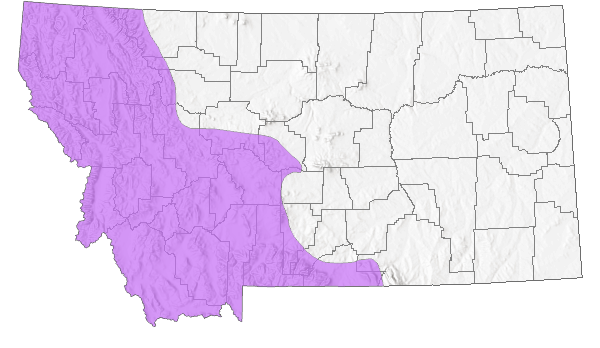
 Native
Native
Range Comments
Alberta, British Columbia, and Yukon in Canada. Alaska, California, Colorado, Idaho, Montana, Nevada, Oregon, Utah, Washington, and Wyoming in U.S.
Observations in Montana Natural Heritage Program Database
Number of Observations: 131
(Click on the following maps and charts to see full sized version)
Map Help and Descriptions
Relative Density
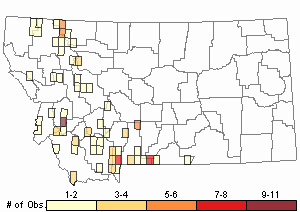
Recency
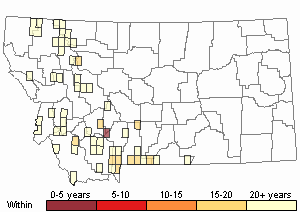
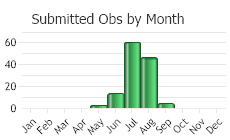
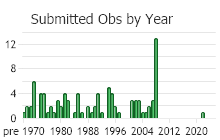
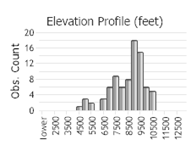 (Observations spanning multiple months or years are excluded from time charts)
(Observations spanning multiple months or years are excluded from time charts)
Habitat
Stony, sparsely vegetated soil of moraine, talus slopes, ridges, streambanks; montane to alpine (Lesica et al. 2018). Cliffs, talus slopes, and gravelly soil in alpine and subalpine habitats at elevations from 2,100 to 4,400 meters (FNA 2010).
Reproductive Characteristics
Flowers: Greenish to purple tinged sepals are glabrous to sparsely pubescent. Whitish-purple, purple to lavender petals are 5–7 mm long. Fruits are spreading to pendulous, 2–5 cm × 1–2.5 mm, and mostly secund. Seeds are narrowly winged and in 1 row per locule (Lesica et al. 2012).
Herbarium specimens include both sexual and apomictic (asexual reproduction) plants, and further study is needed to determine if they should represent the same species (FNA 2010).
Stewardship Responsibility
References
- Literature Cited AboveLegend:
 View Online Publication
View Online Publication Flora of North America Editorial Committee, eds. 2010. Flora of North America North of Mexico. Volume 7. Magnoliophyta: Salicaceae to Brassicaceae. Oxford University Press, Inc., NY. 832 pp.
Flora of North America Editorial Committee, eds. 2010. Flora of North America North of Mexico. Volume 7. Magnoliophyta: Salicaceae to Brassicaceae. Oxford University Press, Inc., NY. 832 pp. Lesica, P., M.T. Lavin, and P.F. Stickney. 2012. Manual of Montana Vascular Plants. Fort Worth, TX: BRIT Press. viii + 771 p.
Lesica, P., M.T. Lavin, and P.F. Stickney. 2012. Manual of Montana Vascular Plants. Fort Worth, TX: BRIT Press. viii + 771 p.
- Additional ReferencesLegend:
 View Online Publication
View Online Publication
Do you know of a citation we're missing? Aho, Ken Andrew. 2006. Alpine and Cliff Ecosystems in the North-Central Rocky Mountains. Ph.D. Dissertation. Bozeman, Montana: Montana State University. 343 p.
Aho, Ken Andrew. 2006. Alpine and Cliff Ecosystems in the North-Central Rocky Mountains. Ph.D. Dissertation. Bozeman, Montana: Montana State University. 343 p. Ament, R.J. 1995. Pioneer Plant Communities Five Years After the 1988 Yellowstone Fires. M.Sc. Thesis. Bozeman, MT: Montana State University. 216 p.
Ament, R.J. 1995. Pioneer Plant Communities Five Years After the 1988 Yellowstone Fires. M.Sc. Thesis. Bozeman, MT: Montana State University. 216 p. Culver, D.R. 1994. Floristic analysis of the Centennial Region, Montana. M.Sc. Thesis. Montana State University, Bozeman. 199 pp.
Culver, D.R. 1994. Floristic analysis of the Centennial Region, Montana. M.Sc. Thesis. Montana State University, Bozeman. 199 pp. Jones, W. W. 1901. Preliminary flora of Gallatin County. M.S. Thesis. Bozeman, MT: Montana State College. 78 pp.
Jones, W. W. 1901. Preliminary flora of Gallatin County. M.S. Thesis. Bozeman, MT: Montana State College. 78 pp. Lesica, P., M.T. Lavin, and P.F. Stickney. 2022. Manual of Montana Vascular Plants, Second Edition. Fort Worth, TX: BRIT Press. viii + 779 p.
Lesica, P., M.T. Lavin, and P.F. Stickney. 2022. Manual of Montana Vascular Plants, Second Edition. Fort Worth, TX: BRIT Press. viii + 779 p. Simanonok, M. 2018. Plant-pollinator network assembly after wildfire. Ph.D. Dissertation. Bozeman, MT: Montana State University. 123 p.
Simanonok, M. 2018. Plant-pollinator network assembly after wildfire. Ph.D. Dissertation. Bozeman, MT: Montana State University. 123 p. Williams, K.L. 2012. Classification of the grasslands, shrublands, woodlands, forests and alpine vegetation associations of the Custer National Forest portion of the Beartooth Mountains in southcentral Montana. M.Sc. Thesis. Bozeman, MT: Montana State University. 376 p.
Williams, K.L. 2012. Classification of the grasslands, shrublands, woodlands, forests and alpine vegetation associations of the Custer National Forest portion of the Beartooth Mountains in southcentral Montana. M.Sc. Thesis. Bozeman, MT: Montana State University. 376 p.
- Web Search Engines for Articles on "Lemmon's Rockcress"





